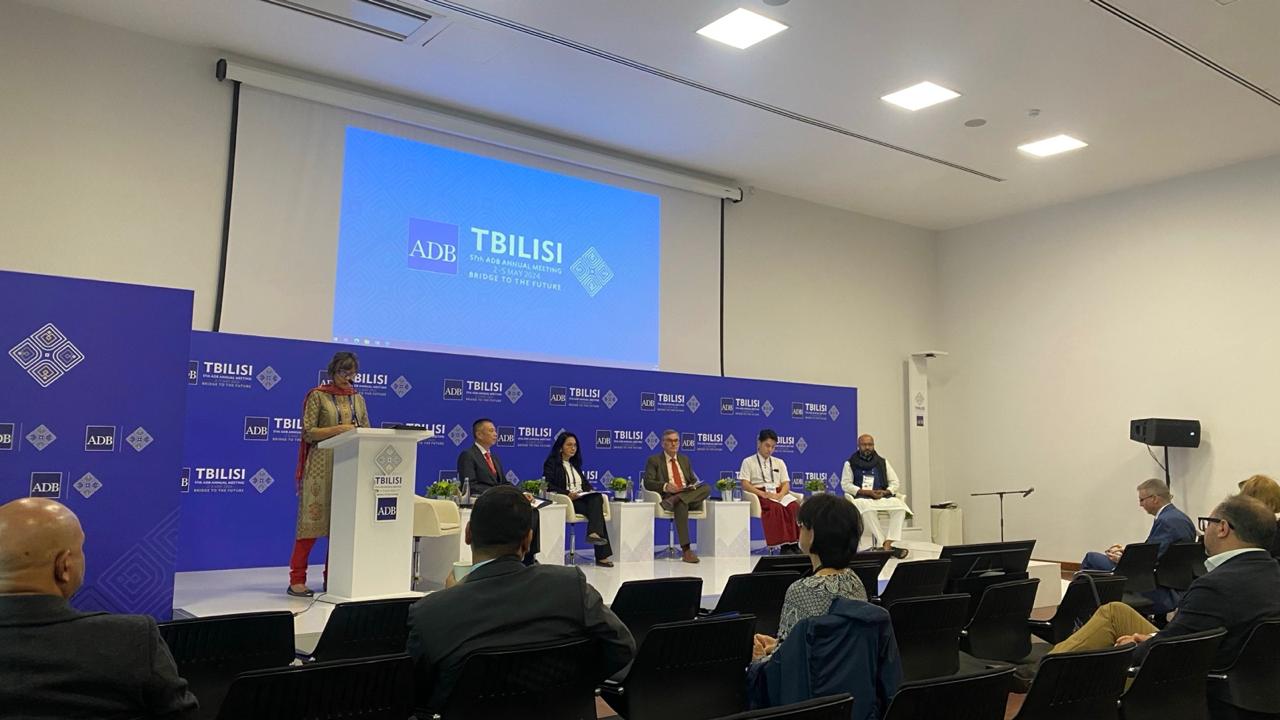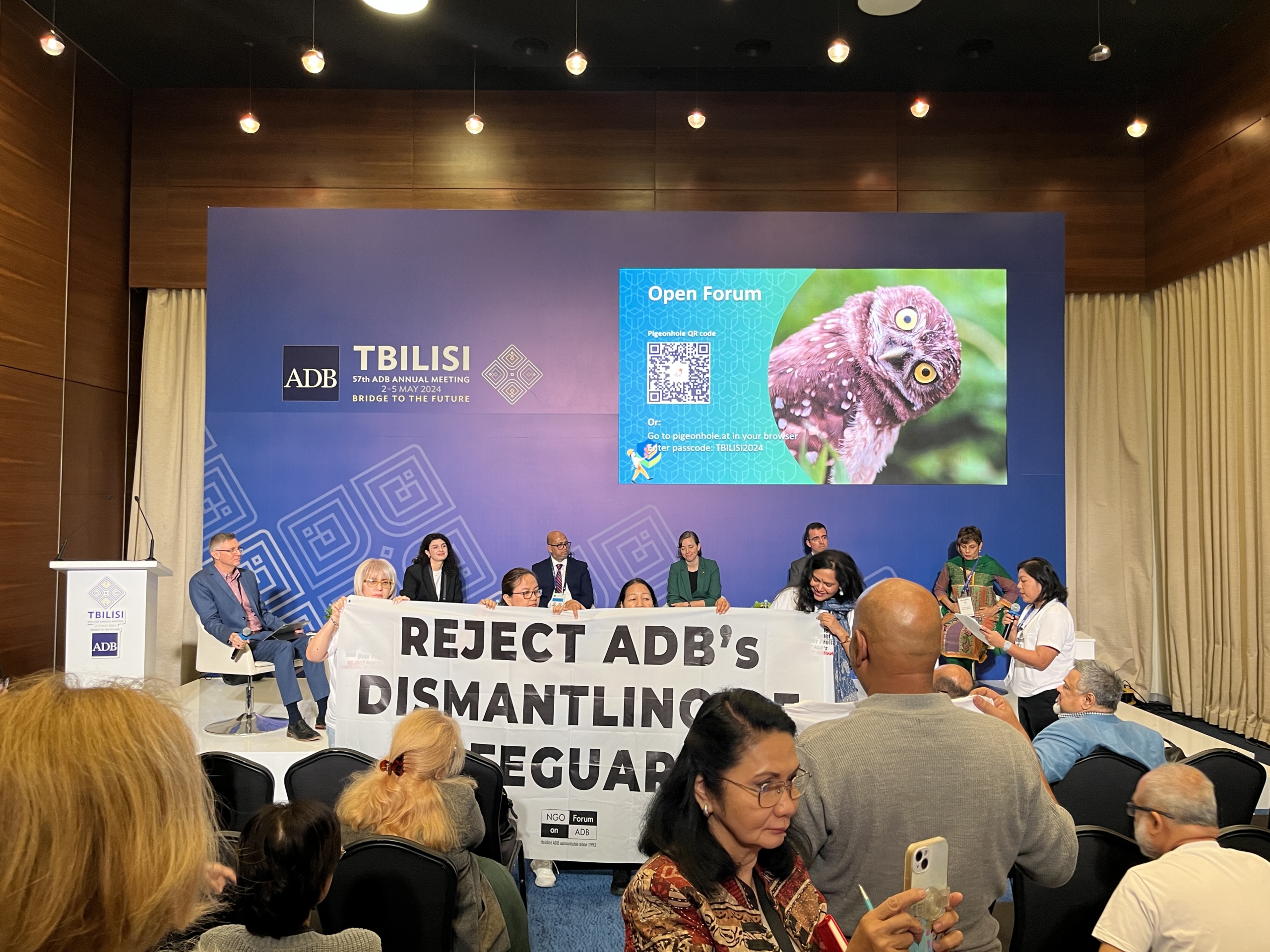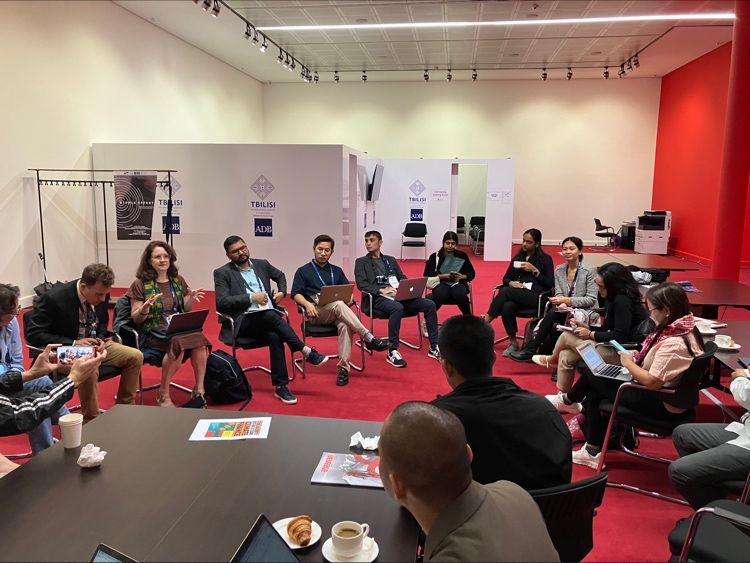Without genuine accountability, communities remain at the receiving end of harmful investments. This can change if the ADB takes concrete steps to place human rights at the core of its policies and investment decisions.
The Asian Development Bank (ADB) is known to invest in projects that prioritise profit over the rights of people and environment. As these projects frequently operate without strong environmental and social safeguards, their activities often reveal systemic shortcomings in addressing issues surrounding business and human rights (BHR), climate justice, and environmental rights.
Among the ADB’s investments, infrastructure and energy projects cover more than 85 per cent of the 336 complaints that the ADB Special Project Facilitator and Compliance Review Panel, the bank’s accountability mechanism, has received so far. Many of these complaints face eligibility issues because project-affected communities and human rights defenders (HRDs) first need to qualify for “prior good faith efforts”, requiring them to engage with bank management actors who they perceive as part of the perpetrators of environmental or social harm. Naturally, most of the complaints are also closed without any output.
Such a requirement is just one of several incredibly difficult barriers towards access to justice for communities and HRDs fearing reprisals.
Now that the ADB is currently undergoing review of its Safeguards Policy, including its Accountability Mechanism Policy, there is an opportunity for the ADB to take concrete steps to integrate a human rights-centred approach towards dealing with the social and environmental impacts of its investments. However, the bank is off to a rough start as its recent draft Environmental and Social Framework (ESF) still lacks a comprehensive way of addressing intimidation and reprisals against affected communities, civil society and HRDs.
With the ambition of becoming the region’s climate bank, the ADB’s impact on human rights and environmental rights remains at odds with its vision of development, including its climate adaptation and finance work and plan towards just transition in Asia.
At the recently concluded ADB Annual Meeting in Tbilisi, Georgia last May 2024, different civil society organisations (CSOs), including FORUM-ASIA, emphasised the need for robust measures for protection, recourse and remedy among communities, civil society and HRDs affected by ADB-supported projects. Prarthana Rao and Ian Salvaña, who both work on environment, BHR and development finance at FORUM-ASIA, talk more about these issues, their engagement with stakeholders, FORUM-ASIA’s larger advocacy efforts and civil society’s collective aspirations.

Side session on ADB’s Accountability Mechanism.
How has FORUM-ASIA been engaging with the ADB and other IFIs over the past year/s? Could you share what brought you to the ADB Annual Meeting?
Prarthana: Participating at the ADB Annual Meeting comes as part of FORUM-ASIA’s broader efforts to address BHR issues in development finance. As we work more on BHR, it has become increasingly clear that any form of justice will require us to start right at the beginning, with the investors and institutions who finance these harmful projects. Tackling human rights violations without recognising and addressing the root cause is futile; we need to hold these institutions accountable and force them to adopt more human rights-centric policies to protect affected communities and prevent reprisals against HRDs.
This is a relatively new space for FORUM-ASIA, which we only started actively exploring last year. In an effort to start engaging with CSOs working on these issues in Asia, we have participated in multiple meetings with development banks and CSOs in the past year. One of them has been the ADB, which was a natural space to start engaging in, considering their investment portfolio in Asia. In 2023, we participated in the ADB Annual Meeting in Incheon for the first time and had the opportunity to meet CSOs working in this field and understand ADB’s engagement on human rights. Since then, FORUM-ASIA also contributed to a civil society critique and recommendations on reprisals due diligence on ADB’s draft ESF. Continuing our efforts to support ADB investments-related advocacy, we also decided to participate in this year’s Annual Meeting in Tbilisi last May.
What were the key discussions and themes that emerged during the meeting, especially concerning the role of IFIs on issues of environment, business and human rights?
Ian: During the ADB Annual Meeting, key discussions among CSOs and between CSOs and the bank centred around the role of IFIs in addressing issues surrounding the impact of the bank’s investments on the rights of local communities and the environment. Right now, the ADB’s safeguards policies are not the best at responding to the needs of project-impacted communities and HRDs. As the bank finalises its updated ESF and undergoes review of its Accountability Mechanism Policy, communities, HRDs and civil society present at the meeting have a similar message for ADB officials and staff: take accountability for the ground realities of communities and HRDs who continue to demand for stronger safeguards and accountability measures for the harms that the banks’ investments have committed.
What were some of the advocacy efforts you focused on during the meeting and what key issues did you aim to address?
Prarthana: As FORUM-ASIA, our strength–through our members and partners–remains in the protection of HRDs and preservation of fundamental freedoms and civic space. This is also reflected in the direction of our advocacy at the ADB Annual Meeting, where we aimed to push for the recognition and protection of HRDs, advocating for more robust and comprehensive policies on reprisals, retaliation and remedy.
Just before the ADB meeting, we participated at the Defenders in Development CSO campaign gathering to develop engagement strategies surrounding the ADB’s safeguards policies. During the meeting, we engaged in a series of meetings with ADB officials and staff to share the experiences of communities, HRDs and civil society with the bank’s accountability mechanism, better understand the bank’s priorities and provide policy recommendations. These efforts were essential for FORUM-ASIA as we develop and strengthen our position and work with different stakeholders.

Civil society intervention during ADB’s seminar on safeguards.
Whom did you interact the most with at the meeting and how did these engagements support your goals?
Ian: We primarily interacted with various CSO groups at the meeting, which was crucial for advancing FORUM-ASIA’s goals of improving accountability and advocating for stronger environmental and social safeguards in development finance in Asia. Many organisations have been doing incredible work in this space for decades, and we want to make sure that the work that we do as FORUM-ASIA complements the existing work, instead of duplicating it. Learning more about their advocacy efforts and connecting with like-minded individuals passionate about human rights and environmental rights will definitely shape FORUM-ASIA’s future IFI engagements through meaningful collaboration.
As we increase our presence in the development finance space, we remain cognisant of how investments and aid affect socio-political environments and civic spaces as well as the rights of affected communities and HRDs, especially with rising authoritarianism in the region. We therefore aim to continue engaging with relevant stakeholders in the coming years to promote a more rights-based framework for development financing.
What was your personal experience of participating in the ADB Annual Meeting? How did attending the meeting influence your perspective on the challenges and opportunities in advocating for human rights and environmental protection in the context of IFI projects?
Prarthana: Participating in the Annual Meeting was insightful. It was a huge learning experience, highlighting both the challenges and opportunities in advocating for more human rights-centred safeguards within ADB’s lending policies.
As someone new to this space of engagement, a persistent challenge I recognised is the convoluted and inaccessible design of the bank’s mechanisms, with the number of departments and verticals within the bank making it difficult for communities to navigate and seek support. The complexity seems almost intentional, forcing communities to give up out of frustration.
The bank’s lack of accountability for human rights violations by its clients and a hands-off approach post-investment further complicate the pursuit of justice for affected communities. For projects that the bank has invested in, it feels like the duty of care ends at the point of investment. For human rights violations perpetrated by their clients, the bank seems unable or unwilling to hold them accountable. This, combined with the relatively weak recognition of international human rights standards, including on BHR and environmental rights, makes the meeting a challenging space to engage in.
Despite these challenges, the ongoing Safeguards Policy Review presents a perfect opportunity for civil society to push for stronger recognition of human rights and environmental rights in the region.

Civil society sit-in on climate finance on the sidelines of the ADB Annual Meeting. (Photo/Daniel Willis)
Can you share any memorable stories or experiences from your time in Tbilisi that highlight the importance of these advocacy efforts?
Ian: The ADB Annual Meeting came at a tumultuous time as protests have been ongoing in Tbilisi and other parts of Georgia against the “foreign agents” bill, similar to Russia’s legislation used to suppress dissent. Across Asia, different governments use similar repressive measures to target civil society, the media and communities. In the development finance space, it’s common for aid and investments to be funnelled through governments with poor human rights records. As the ADB meeting inevitably overlapped with observing the protests, bringing in the message of people’s dissent against shrinking civic spaces was especially important for those of us who work with communities and HRDs continuously impacted by state-sanctioned corporate abuses. Especially in repressive governments, if legislation continues to be used to stifle people’s fundamental rights and freedoms, it’s difficult to ensure that no rights would be violated in the process of implementing projects supported by bank investments and that, if there are indeed violations, communities are able to access recourse and remedies free from reprisals from perpetrators. Banks, including the ADB, should therefore commit to rigorous due diligence on the human rights impact of their investments and, in the absence of effective and sustainable protection mechanisms, should pull out all their investments from repressive regimes.
Looking ahead, how does FORUM-ASIA plan to continue its advocacy with IFIs like the ADB, and what future activities or strategies is FORUM-ASIA considering to further support affected communities and HRDs?
Prarthana: In the next few years, we see our engagement as being two-fold. Firstly, we hope to work with banks to develop and implement more human rights and reprisals-centric language related to the protection of HRDs. And secondly, we aim to work with project-affected communities to enhance participation and access to remedies for violations of their rights. Through our members and partners, we hope to reach more grassroots communities so that we can hold banks and other IFIs accountable for their role in perpetrating human rights and environmental rights violations. We also look forward to collaborating more with CSOs in the coming years to ensure stronger solidarity in support of our collective call for a more inclusive, just and human rights-friendly bank.



